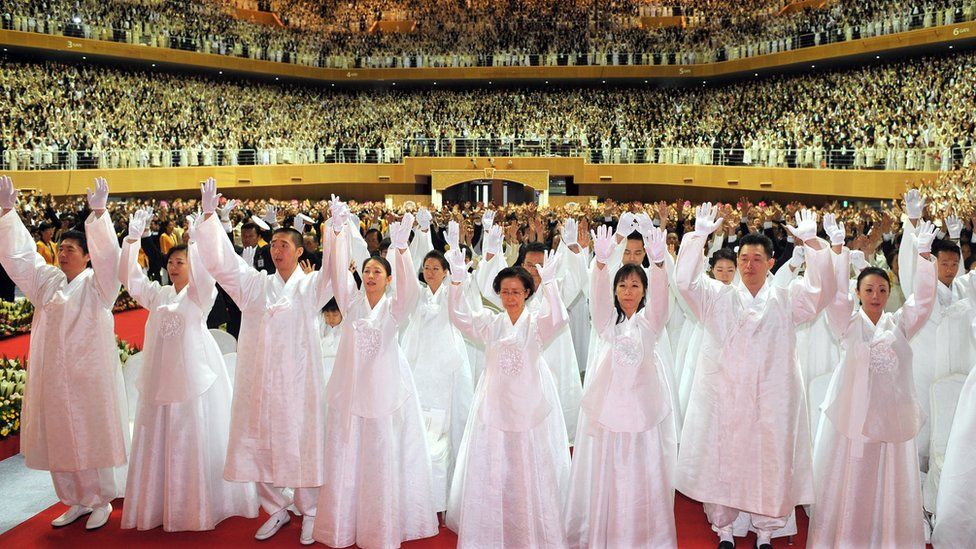Japan asks court to dissolve 'Moonies' church over Shinzo Abe killing
- Published

The Japanese government has asked a court to order the dissolution of a church that was investigated after the assassination of former prime minister Shinzo Abe, local media reports.
Abe's shock killing last July put the spotlight on the Unification Church, more popularly known as "Moonies".
His assailant, Tetsuya Yamagami, said the church bankrupted his mother and blamed Abe for promoting it.
The church says it has been unfairly vilified over Abe's assassination.
The investigation, which was ordered by Prime Minister Fumio Kishida, ran for a year.
If dissolved, the Unification Church will lose its tax benefits but it will still be able to operate as an organisation.
Yamagami claimed his mother was forced to donate to the church, where she was a member for three decades. Similar allegations have been the subject of lawsuits worth millions of dollars.
Under Japan's Religious Corporations Law, a religious order can be dissolved if its actions are "clearly recognised as being substantially detrimental to public welfare".
Japan's education ministry earlier asked the Tokyo District Court to fine the church for failing to answer queries about its activities.
Abe's relationship with the church was the subject of much speculation before his death, especially on social media.
He appeared remotely as a speaker at a church-related event in 2021. His grandfather - also a former PM - was said to have been close to the church due to its anti-communist stance.
Founded in South Korea in 1954, the Unification Church is known for holding mass weddings. Its members are more commonly known as 'Moonies', after its late founder Sun Myung Moon.
It entered Japan in the 1960s and cultivated ties with politicians to grow its following and reputation, researchers say.
The church has been mired in controversy for years, being described by critics as "cult -like".
It has faced multiple lawsuits from members who claim that they were forced to donate to the church. Their lawyers say the complainants lost at least 5.4bn yen ($39m; £33m) in the past five years.
An internal investigation by incumbent Prime Minister Fumio Kishida's Liberal Democratic Party found that 179 of its 379 lawmakers had interacted with the Unification Church.
Mr Kishida subsequently ordered LDP lawmakers to cut ties with the Unification Church, and also stressed that he had no personal connections to the group.
Last October, he ordered an investigation into the church - after previously resisting calls to do so - and said he was "taking seriously" accusations that the church had exploited its followers for money.
The power of the "highly problematic" church could be diminished considerably, said Professor Yoshihide Sakurai of Hokkaido University, who has written a book on the Unification Church and is an expert on cult issues.
The public will become wary of it, while it will be considered scandalous for politicians to have a relationship with it, Prof Sakurai said.
However, the group still has dozens of affiliated political and business organisations, including newspaper publishing companies, travel agents and retailers, and their operations cannot be stopped by the court order, he said.
Prof Sakurai said the court may not even grant the dissolution order.
"Tens of thousands of followers still assert that they joined the church by their own choice and continue to participate in its activities. With both victims and followers existing at the same time, it will be quite difficult for the court to find the organisation to be completely criminal," he said.
Additional reporting by Hideharu Tamura in Tokyo
- Published17 October 2022
- Published23 July 2022